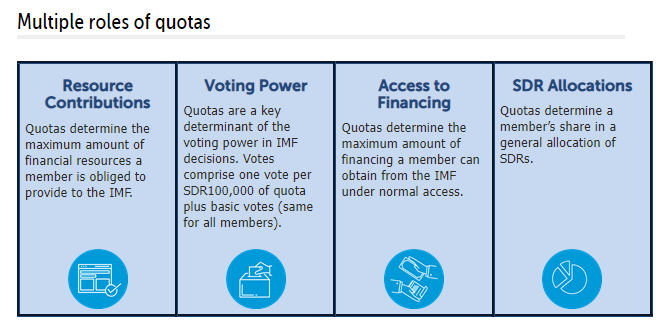Review of IMF Role | 20 Oct 2021
Why in News
Recently, in the backdrop of the 2021 annual meetings of the World Bank Group and the International Monetary Fund (IMF), leading experts have suggested the need to review the role of the IMF.
- With a continuing trend of emerging markets increasing their share in global output or GDP, there is a need for review of the quota system.
- Apart from this, there is a need for maintaining data integrity amid the World Bank discontinuing its Ease of Doing Business reports.
- The IMF was set up along with the World Bank after the Second World War to assist in the reconstruction of war-ravaged countries. The two organisations were agreed to be set up at a conference in Bretton Woods in the US. Hence, they are known as the Bretton Woods twins.
Key Points
- Need for IMF Reforms:
- Quota Reforms:
- The IMF's quota system was created to raise funds for loans.
- Each IMF member country is assigned a quota, or contribution, that reflects the country's relative size in the global economy. Each member's quota also determines its relative voting power as well as its borrowing capacity.
- This makes wealthy countries have more say in the making and revision of rules.
- This leads to the problem where countries that grow economically have tended to become under-represented as their voting power lags behind. For eg: BRICS countries.
- Quotas are denominated in Special Drawing Rights (SDRs), the IMF’s unit of account.
- SDR is a potential claim on the freely usable currencies of IMF members. SDRs can be exchanged for these currencies.
- The IMF's Board of Governors conducts general reviews of quotas at regular intervals (no more than five years apart).
- Quota Reforms:
Earlier Quota Reforms
- In 2010, the IMF’s Quota and Governance Reforms were drafted; which finally became effective in 2016.
- These reforms shifted more than 6% of the quota shares to emerging and developing countries from the US and European countries.
- Under this, India’s voting rights increased by 0.3% from then 2.3% to 2.6% and China’s voting rights increased by 2.2% from then 3.8% to 6%.
- Presently, India holds 2.75% of SDR quota, and 2.63% of votes in the IMF.
- Restructuring of the Article IV Consultations: Under Article IV consultations, the IMF holds bilateral discussions with its members usually every year and its staff prepares a report.
- Article IV consultation is the most powerful instrument and it needs to be restructured and sharpened to make it more useful by using the new technologies and access to public data.
Proposed Reforms
- Refroming Quota System: The quota reform would reflect the changed economic realities, especially with regard to the increasing capabilities of the developing nations.
- For example, the quota of BRICS countries should increase and that of European Union Countries should decrease.
- Also, it is important that the new quota formula give more weight to PPP GDP to better reflect the true economic strength of emerging markets and developing economies.
Purchasing Power Parity
- PPP is a popular metric used by macroeconomic analysis that compares different countries' currencies through a "basket of goods" approach.
- PPP allows for economists to compare economic productivity and standards of living between countries.
- Some countries adjust their Gross Domestic Product (GDP) figures to reflect PPP.
- Helping Lower Income Countries: The IMF should focus on lower income countries and support other developing countries’ market funds raising activities, as its Article IV consultation reports are utilised by credit rating agencies, impacting the fund raising capacity of countries like India.
- Most of the Asian countries including India can now raise funds on their own on the basis of strength of their forex reserves, and do not have to necessarily go to the IMF like in the past to tide of crisis.
- Management Reforms: The management system in the IMF should be modified.
- In the IMF and World Bank group, there is an informal arrangement, that the head of the IMF should be a European and the head of the World Bank should be an American.
- The time has come to reconsider this, and the IMF probably should really rethink it.

